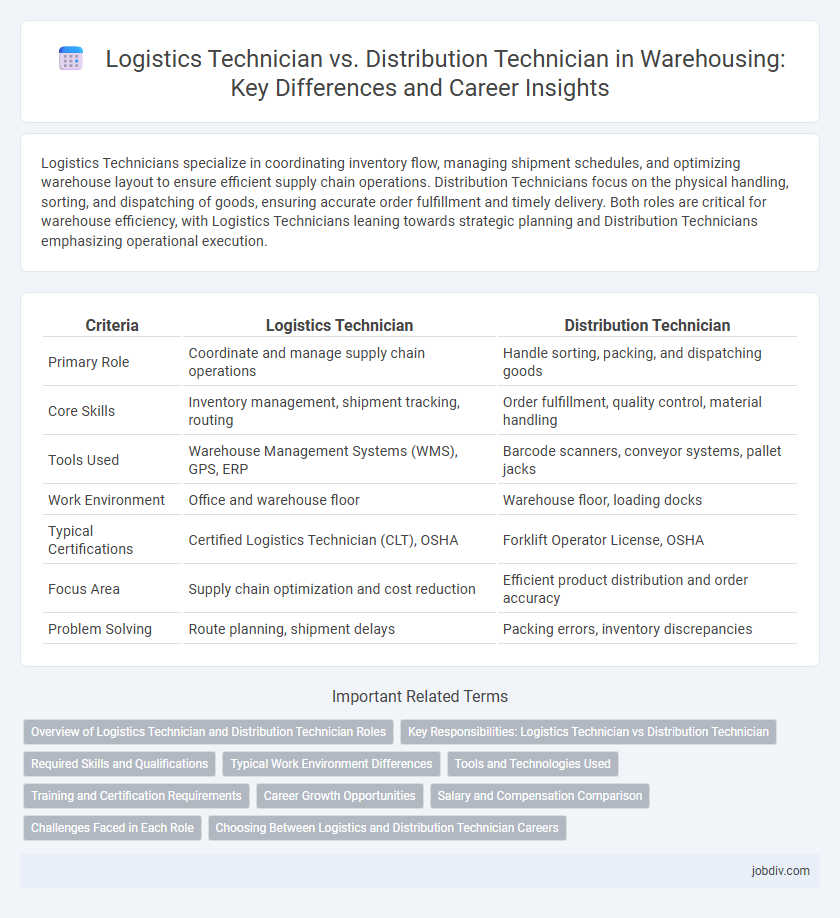Logistics Technicians specialize in coordinating inventory flow, managing shipment schedules, and optimizing warehouse layout to ensure efficient supply chain operations. Distribution Technicians focus on the physical handling, sorting, and dispatching of goods, ensuring accurate order fulfillment and timely delivery. Both roles are critical for warehouse efficiency, with Logistics Technicians leaning towards strategic planning and Distribution Technicians emphasizing operational execution.
Table of Comparison
| Criteria | Logistics Technician | Distribution Technician |
|---|---|---|
| Primary Role | Coordinate and manage supply chain operations | Handle sorting, packing, and dispatching goods |
| Core Skills | Inventory management, shipment tracking, routing | Order fulfillment, quality control, material handling |
| Tools Used | Warehouse Management Systems (WMS), GPS, ERP | Barcode scanners, conveyor systems, pallet jacks |
| Work Environment | Office and warehouse floor | Warehouse floor, loading docks |
| Typical Certifications | Certified Logistics Technician (CLT), OSHA | Forklift Operator License, OSHA |
| Focus Area | Supply chain optimization and cost reduction | Efficient product distribution and order accuracy |
| Problem Solving | Route planning, shipment delays | Packing errors, inventory discrepancies |
Overview of Logistics Technician and Distribution Technician Roles
Logistics Technicians manage inventory control, shipment coordination, and supply chain communication to ensure efficient storage and distribution of goods. Distribution Technicians focus on order fulfillment, packaging, and preparing shipments for delivery within warehouse and transportation systems. Both roles require expertise in warehouse management systems, attention to detail, and coordination skills to optimize operational flow.
Key Responsibilities: Logistics Technician vs Distribution Technician
Logistics Technicians manage inventory control, coordinate shipment scheduling, and track supply chain activities to ensure timely delivery and accurate stock levels. Distribution Technicians focus on sorting, packing, and dispatching products, maintaining distribution center efficiency and order accuracy. Both roles require proficiency in warehouse management systems and strong organizational skills to support seamless logistics operations.
Required Skills and Qualifications
Logistics Technicians require strong skills in supply chain management, inventory control, and proficiency with warehouse management systems (WMS) along with qualifications such as a high school diploma and certification in logistics or supply chain operations. Distribution Technicians focus on order fulfillment, packaging, and equipment operation, necessitating skills in material handling, attention to detail, and often a forklift operator certification or vocational training in distribution processes. Both roles benefit from experience with barcode scanning technologies and knowledge of safety regulations in warehousing environments.
Typical Work Environment Differences
Logistics Technicians primarily operate in offices or control rooms where they manage inventory systems and coordinate shipments, often using computer software to track goods. Distribution Technicians spend most of their time on warehouse floors or loading docks, handling physical products, organizing inventory, and ensuring accurate order fulfillment. The work environment for Distribution Technicians is generally more physically demanding with exposure to noise and machinery, while Logistics Technicians experience a more administrative setting focused on data management and communication.
Tools and Technologies Used
Logistics Technicians primarily utilize warehouse management systems (WMS), barcode scanners, and RFID technology to track inventory and optimize supply chain processes. Distribution Technicians focus on using automated sorting machines, conveyor systems, and palletizing robots to enhance order fulfillment and product dispatch efficiency. Both roles leverage handheld devices and software platforms for real-time data entry and performance monitoring within warehousing operations.
Training and Certification Requirements
Logistics technicians typically require certification in supply chain management systems and proficiency in inventory software, with training focused on transportation, warehousing, and order fulfillment processes. Distribution technicians often need specialized certification in material handling equipment and safety standards, emphasizing hands-on training in sorting, packaging, and shipping operations. Both roles demand continuous professional development to keep pace with technological advancements and industry regulations in warehousing and distribution.
Career Growth Opportunities
Logistics Technicians often have broader career growth opportunities due to their involvement in supply chain management, inventory control, and transportation coordination, which can lead to roles like logistics manager or supply chain analyst. Distribution Technicians typically focus on warehouse operations, order fulfillment, and shipment processing, with career advancement paths toward distribution supervisor or warehouse manager positions. Both roles offer specialization opportunities, but Logistics Technicians generally experience faster growth through cross-functional logistics expertise.
Salary and Compensation Comparison
Logistics Technicians typically earn a median annual salary of $45,000 to $55,000, reflecting their expertise in supply chain management and inventory control, while Distribution Technicians often have slightly lower earnings ranging from $40,000 to $50,000, focusing primarily on product sorting and order fulfillment. Benefits and bonuses for Logistics Technicians tend to be more comprehensive due to their involvement in strategic planning and transportation coordination. Compensation packages for Distribution Technicians usually emphasize hourly wages and overtime pay in warehouse operations.
Challenges Faced in Each Role
Logistics Technicians often face challenges related to coordinating complex supply chain processes, managing inventory accuracy, and ensuring timely delivery amidst fluctuating demand. Distribution Technicians encounter difficulties in handling the efficient sorting, packing, and dispatching of goods while maintaining quality control and minimizing errors. Both roles require adapting to evolving technologies and regulatory compliance to optimize warehousing operations.
Choosing Between Logistics and Distribution Technician Careers
Logistics technicians specialize in managing supply chain processes, inventory control, and coordinating transportation schedules to ensure efficient warehouse operations. Distribution technicians focus on order fulfillment, package sorting, and maintaining accurate shipment records to streamline outbound distribution. Choosing between these careers depends on whether you prefer overseeing broader supply chain logistics or concentrating on hands-on distribution and delivery tasks.
Logistics Technician vs Distribution Technician Infographic

 jobdiv.com
jobdiv.com